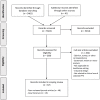Facial protection for healthcare workers during pandemics: a scoping review
- PMID: 32371574
- PMCID: PMC7228486
- DOI: 10.1136/bmjgh-2020-002553
Facial protection for healthcare workers during pandemics: a scoping review
Abstract
Background: The coronavirus disease 2019 (COVID-19) pandemic has led to personal protective equipment (PPE) shortages, requiring mask reuse or improvisation. We provide a review of medical-grade facial protection (surgical masks, N95 respirators and face shields) for healthcare workers, the safety and efficacy of decontamination methods, and the utility of alternative strategies in emergency shortages or resource-scarce settings.
Methods: We conducted a scoping review of PubMed and grey literature related to facial protection and potential adaptation strategies in the setting of PPE shortages (January 2000 to March 2020). Limitations included few COVID-19-specific studies and exclusion of non-English language articles. We conducted a narrative synthesis of the evidence based on relevant healthcare settings to increase practical utility in decision-making.
Results: We retrieved 5462 peer-reviewed articles and 41 grey literature records. In total, we included 67 records which met inclusion criteria. Compared with surgical masks, N95 respirators perform better in laboratory testing, may provide superior protection in inpatient settings and perform equivalently in outpatient settings. Surgical mask and N95 respirator conservation strategies include extended use, reuse or decontamination, but these strategies may result in inferior protection. Limited evidence suggests that reused and improvised masks should be used when medical-grade protection is unavailable.
Conclusion: The COVID-19 pandemic has led to critical shortages of medical-grade PPE. Alternative forms of facial protection offer inferior protection. More robust evidence is required on different types of medical-grade facial protection. As research on COVID-19 advances, investigators should continue to examine the impact on alternatives of medical-grade facial protection.
Keywords: control strategies; prevention strategies; public health; respiratory infections; review.
© Author(s) (or their employer(s)) 2020. Re-use permitted under CC BY-NC. No commercial re-use. See rights and permissions. Published by BMJ.
Conflict of interest statement
Competing interests: None declared.
Figures
Similar articles
-
COVID-19 pandemic and personal protective equipment shortage: protective efficacy comparing masks and scientific methods for respirator reuse.Gastrointest Endosc. 2020 Sep;92(3):519-523. doi: 10.1016/j.gie.2020.04.048. Epub 2020 Apr 27. Gastrointest Endosc. 2020. PMID: 32353457 Free PMC article. Review.
-
Personal protective equipment (PPE) in a pandemic: Approaches to PPE preservation for South African healthcare facilities.S Afr Med J. 2020 Apr 30;110(6):466-468. doi: 10.7196/SAMJ.2020.v110i6.14831. S Afr Med J. 2020. PMID: 32880554
-
A rapid systematic review of the efficacy of face masks and respirators against coronaviruses and other respiratory transmissible viruses for the community, healthcare workers and sick patients.Int J Nurs Stud. 2020 Aug;108:103629. doi: 10.1016/j.ijnurstu.2020.103629. Epub 2020 Apr 30. Int J Nurs Stud. 2020. PMID: 32512240 Free PMC article.
-
Effect of extended use N95 respirators and eye protection on personal protective equipment (PPE) utilization during SARS-CoV-2 outbreak in Singapore.Antimicrob Resist Infect Control. 2020 Jun 15;9(1):86. doi: 10.1186/s13756-020-00753-2. Antimicrob Resist Infect Control. 2020. PMID: 32539765 Free PMC article. No abstract available.
-
Personal protective equipment (PPE) and infection among healthcare workers - What is the evidence?Int J Clin Pract. 2020 Nov;74(11):e13617. doi: 10.1111/ijcp.13617. Epub 2020 Sep 9. Int J Clin Pract. 2020. PMID: 32734641 Review.
Cited by
-
Incidence and characteristics of otitis media with effusion in adults before, during, and after the COVID-19 pandemic.Eur Arch Otorhinolaryngol. 2024 May;281(5):2275-2280. doi: 10.1007/s00405-023-08338-6. Epub 2023 Dec 12. Eur Arch Otorhinolaryngol. 2024. PMID: 38085307
-
Safety for the Rhinologist in the Age of COVID-19: Mask Use, Nasal Corticosteroids, Saline Irrigation, and Endoscopic Procedures - Literature Review.Int Arch Otorhinolaryngol. 2022 Jan 25;26(1):e137-e147. doi: 10.1055/s-0041-1740988. eCollection 2022 Jan. Int Arch Otorhinolaryngol. 2022. PMID: 35096171 Free PMC article.
-
The Impact of COVID-19 on Multidrug-Resistant Bacteria at a Slovenian Tertiary Medical Center.Antibiotics (Basel). 2024 Feb 23;13(3):214. doi: 10.3390/antibiotics13030214. Antibiotics (Basel). 2024. PMID: 38534649 Free PMC article.
-
COVID-19 false dichotomies and a comprehensive review of the evidence regarding public health, COVID-19 symptomatology, SARS-CoV-2 transmission, mask wearing, and reinfection.BMC Infect Dis. 2021 Jul 27;21(1):710. doi: 10.1186/s12879-021-06357-4. BMC Infect Dis. 2021. PMID: 34315427 Free PMC article. Review.
-
Personal protective equipment for reducing the risk of COVID-19 infection among health care workers involved in emergency trauma surgery during the pandemic: An umbrella review.J Trauma Acute Care Surg. 2021 Apr 1;90(4):e72-e80. doi: 10.1097/TA.0000000000003073. J Trauma Acute Care Surg. 2021. PMID: 33433175 Free PMC article.
References
-
- World Health Organization Novel Coronavirus (2019-nCoV) situation reports [Internet]. Available: https://www.who.int/emergencies/diseases/novel-coronavirus-2019/situatio... [Accessed 23 Mar 2020].
-
- WHO Director General’s opening remarks at the media briefing on 2019 novel coronavirus, 2020. Available: https://www.who.int/dg/speeches/detail/who-director-general-s-opening-re... [Accessed 23 Mar 2020].
-
- Padilla M. ‘It Feels Like a War Zone’: Doctors and Nurses Plead for Masks on Social Media. The New York Times [Internet], 2020. Available: https://www.nytimes.com/2020/03/19/us/hospitals-coronavirus-ppe-shortage... [Accessed 23 Mar 2020].
-
- World Health Organization Rational use of personal protective equipment (PPE) for coronavirus disease (COVID-19): interim guidance, 19 March 2020. Institutional Repos Inf Shar 2020:7.
Publication types
MeSH terms
LinkOut - more resources
Full Text Sources
Other Literature Sources
Research Materials
Miscellaneous

